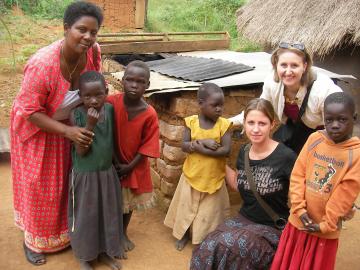Letter from Uganda

Entebbe is a sprawling, sleepy town on the Ugandan shore of Lake Victoria. I was there from September to November as the country was attempting to westernize and impress for the Commonwealth Heads of Government Meeting it was hosting in November. It was the final term of my law degree, and I wanted one last adventure before embarking on my career. So I went to Uganda to volunteer at Entebbe Women Association, a local non-profit organization engaged in a variety of poverty reduction programs aimed at women and children.
Before arriving, I was not exactly sure what to expect of the place or the work. I was hoping to use my legal skills but said that I was willing to do anything that the organization needed. As it happened, what they really needed was someone to spearhead a child labour awareness campaign in the local primary schools.
When people from Western countries think of child labour, we often think of children toiling for long hours in sweatshops. But child labour is so much more than that. It is the five-year-old sent to fetch water with a 20-litre jerry can, the young boy helping his father fish or make bricks, the orphan working 12-hour days crushing stones, the 14-year-old house girl no longer in school, the children who miss class every Friday to sell food on the roadside and the young boys and girls kidnapped and traded for use as soldiers and sex slaves in areas of conflict.
The program was met with resistance by some of the teachers and school staff afraid that I would impose my Western values on their children. I was told that culturally, African children are expected to work, which is true. The challenge I faced then was to draw that fine line between the type of work that children can do versus the type of work that we call child labour. I had to do this without imposing my own values as a Canadian and yet still maintaining the international standards of children’s rights that Uganda has committed to upholding.
Once we started delivering the program, I was thrilled to learn that many children were already familiar with their rights as a child. Unfortunately, few of them had ever heard of the term “child labour” or the idea that certain work is not appropriate for them.
Even more disheartening was the realization that most of the students were involved in child labour in one way or another and that telling them to protect themselves from it was simply not enough. If families are not provided with other means of generating income to pay for school fees or other necessities, many of these kids will continue to work in conditions not appropriate for children.
When all was said and done, the program was well received by both students and staff. At the end of each school presentation, we helped the students elect child rights support groups in hopes that those groups will provide a means for further dialogue and monitoring of child labour and other forms of child abuse in the schools.
Because this program is completely unfunded, however, the organization will likely face challenges in monitoring and supporting this work in the long term—a common problem for small non-governmental organizations in Uganda that are almost completely reliant on foreign support.
For me, I feel that I gained much more than I gave. Thanks to a variety of funders, including the Student International Activities Fund, One World Scholarship, Department of Justice, Branton Endowment and Devlin Gailus, I met so many beautiful and bright children who never stop trying despite it all, and made many friends that I will keep for life.
If anyone would like more information on the Entebbe Women Association or my work there, please email cchunick@gmail.com.

